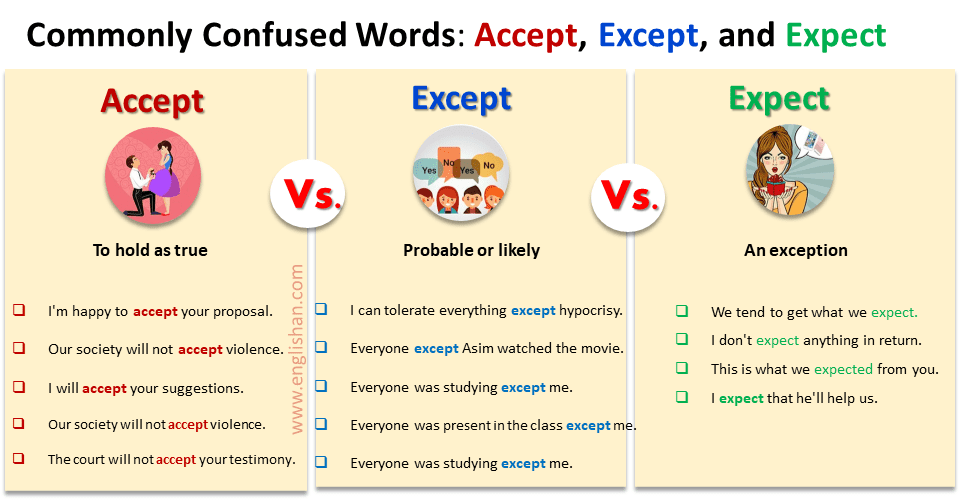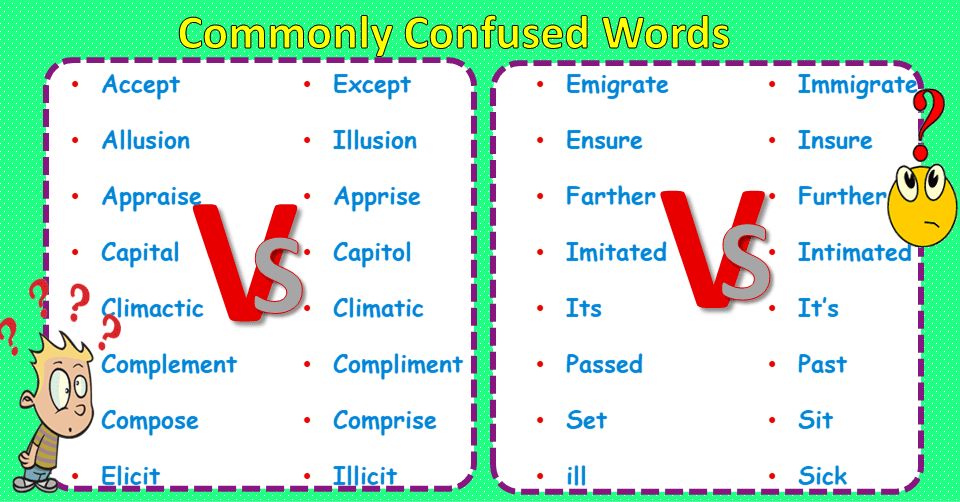As we know there are multiple words in English that share similar pronunciation, meaning, and spelling with other words, and these words are called commonly confused words, or homophones. Homophones (homo means the same and phone means sound or voice) are words that sound the same but have different spellings and meanings. For example, rose (flower) and rows (lines) or cite (reference), sight (vision), and site (place) or accept (to receive) and except (to exclude), etc. These words are so similar that sometimes it’s difficult to know which one should we use. For instance, I will ___ your decision. (Except/ Accept/ Expect) which is the right one to use here. People often mess up these words and use them incorrectly. So in this article, we will focus on these respective words that are often confused and misused accept, except, and expect. Accept and except are homophones and easily confused words because they look and sound the same. Here We will learn what they mean, and how we can pronounce and use them accurately with various examples. Let’s start with “accept”.
Accept /ak-sept/
The word Accept means to take or receive something willingly that is offered, to admit something, to believe that something is true, to express approval or consent, or to say yes, etc. For instance,
They accept your challenge.
It means that someone has challenged them and now they are willing to receive that challenge.
Accept is an action word that always functions as a transitive verb in a sentence, it requires or demands an object to receive action. For example,
He won’t accept ___
He won’t accept what or whom? So without an object, this sentence is not expressing a complete sense because accept is a transitive verb and it demands a direct or indirect object (my apologies) to complete its meaning.
He won’t accept my apologies.
Accept is a two-syllable word ac-cept the first syllable ac is unstressed and the second syllable cept is stressed. It’s pronounced as ak-sept or uhk-sept which is similar to adapt, kept, or slept, etc. Accept is often confused with the word except because the ending of both words is absolutely the same accept, except here the difference is in the first syllable, the often word accept starts with a sound, and the word except begins with the I sound. Accept (to agree) is spelled with the Ac and except (to exclude) is spelled with the Ex, (A-c-c-e-p-t).
Examples,
- I’m happy to accept your proposal.
- You have to accept the consequences.
- I will accept your suggestions.
- I am glad that you have accepted our invitation.
- They have no choice but to accept the truth.
- Her explanation was not accept
- Sartre refused to accept the Nobel Prize money.
- Let me know if you are ready to accept this job.
- Our society will not accept
- The court will not accept your testimony.
- I will accept your apology if you promise me that you will not repeat this mistake.
-
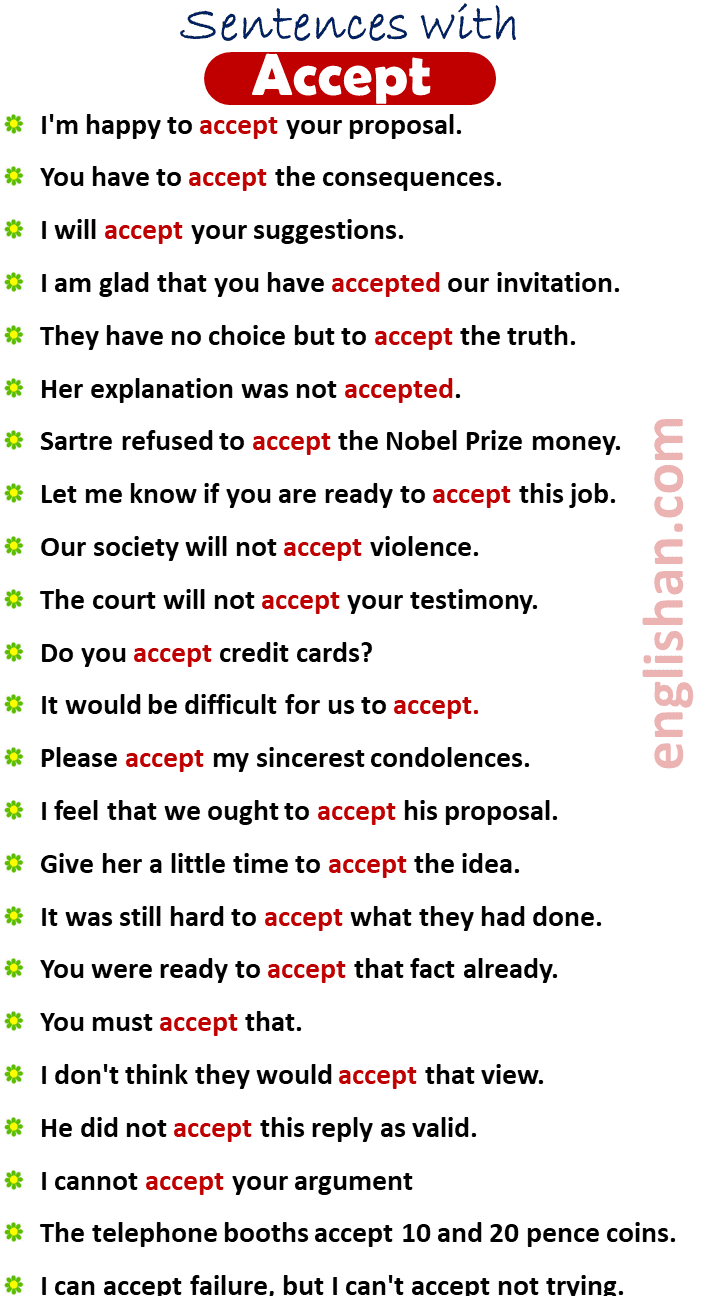
Using Accept in Sentences
Except /ik-sept/
The word except means to not include or exclude someone or something, other than, or apart from, and when it’s used as a conjunction, it means but not, only, or with the exclusion of, etc. Except usually used at the end of the sentence with a noun.
He will teach you every day except Sunday.
So here Sunday is not included among the days on which he will teach. He will teach every day of the week but not on Sunday۔
Except often function as a preposition or conjunction and sometimes it is used as a verb in a sentence. For instance,
Except Ali, the entire class passed the exam. (preposition)
Nothing is permanent except change. (preposition)
I don’t know anything except that he is going to fire you.(conjunction)
Every day he goes for a walk except when it is raining. (conjunction)
He was excepted from the emergency session. (verb)
Except is also a two-syllable word ex-cept the first syllable ex is unstressed and the second syllable cept is stressed. It’s pronounced as ik-sept or uhk-sept which is similar to accept, adapt, concept, or slept, etc. It is spelled with Ex (E-x-c-e-p-t) and starts with the I sound. The word “except” is often confused with both the words “accept” and “except” because it shares a suffix cept (accept, except) with “accept” and a prefix Ex (except, expect) with the word “expect.”
Examples,
- I eat all fruits except strawberries.
- You can visit our company anytime except Sunday.
- He likes to watch all movies except horror movies.
- I can tolerate everything except hypocrisy.
- Everyone except Asim watched the movie.
- I want to travel all over the world except Asia.
- We play cricket every day except Friday.
- Everyone was present in the class except me.
- Everyone was studying except me.
- All human beings have brains except you.
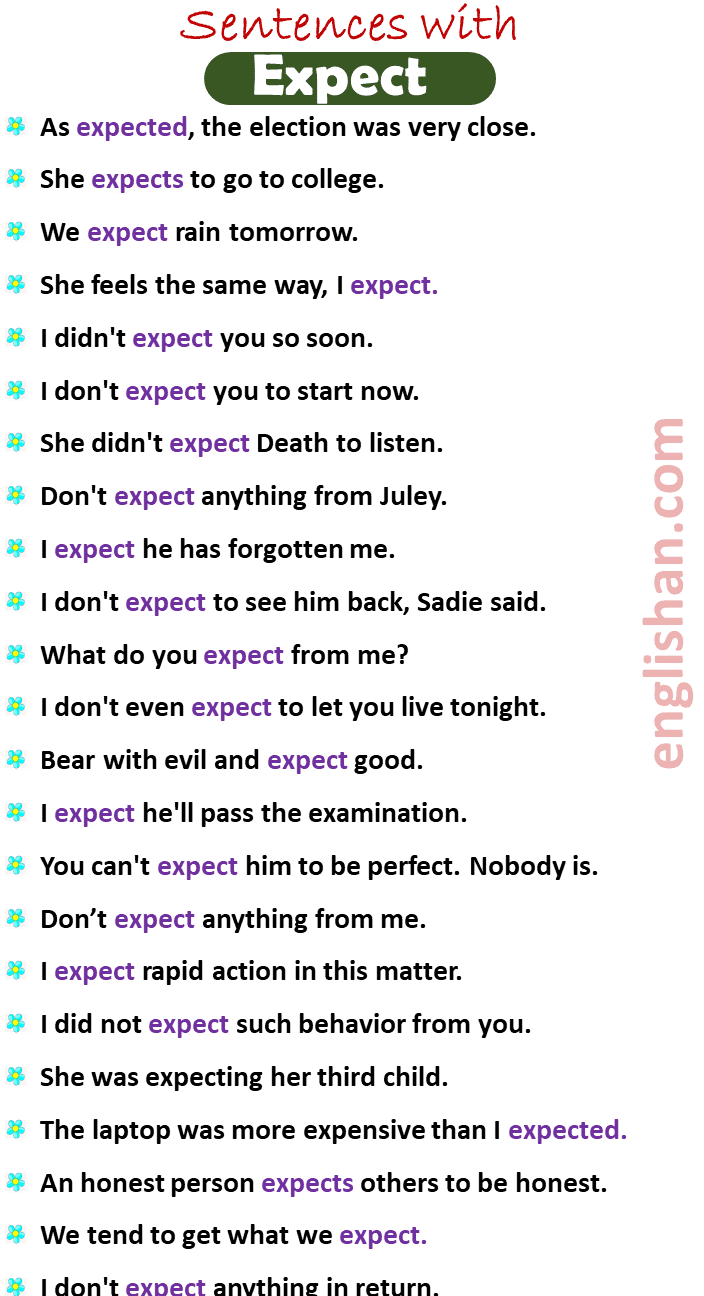
Expect /ik-spekt/
The word expect means to think or believe that something will happen, to anticipate or predict, to hope or wish, etc. For instance,
Rain is expected tomorrow.
Here someone is thinking or predicting that it will rain tomorrow.
They expect you to pass the exam.
It means they believe or hopes that he will clear the exam.
Expect is a two-syllable word Ex–pect the first syllable ex is unstressed and the second syllable pect is stressed. It’s pronounced as ik-spekt which is similar to respect, aspect, reject, perfect, etc. The word expect is often confused with the word except because the first syllable of both words is the same “Ex” (expect, except) but the difference here is in the second syllable, in the word expect the second syllable is pect, and in the word except the second syllable is cept (expect, except) So it is spelled with the P in the middle of the word (A-x-p-e-c-t).
Examples,
- Don’t expect anything from me.
- I expect rapid action in this matter.
- I did not expect such behavior from you.
- She was expecting her third child.
- The laptop was more expensive than I expect
- An honest person expects others to be honest.
- We tend to get what we expect.
- I don’t expect anything in return.
- This is what we expected from you.
- I expect that he’ll help us.
- Don’t expect too much from others.
- He expects that everyone except Ali will accept his invitation.
- Don’t expect only to accept whatever your life gives you.
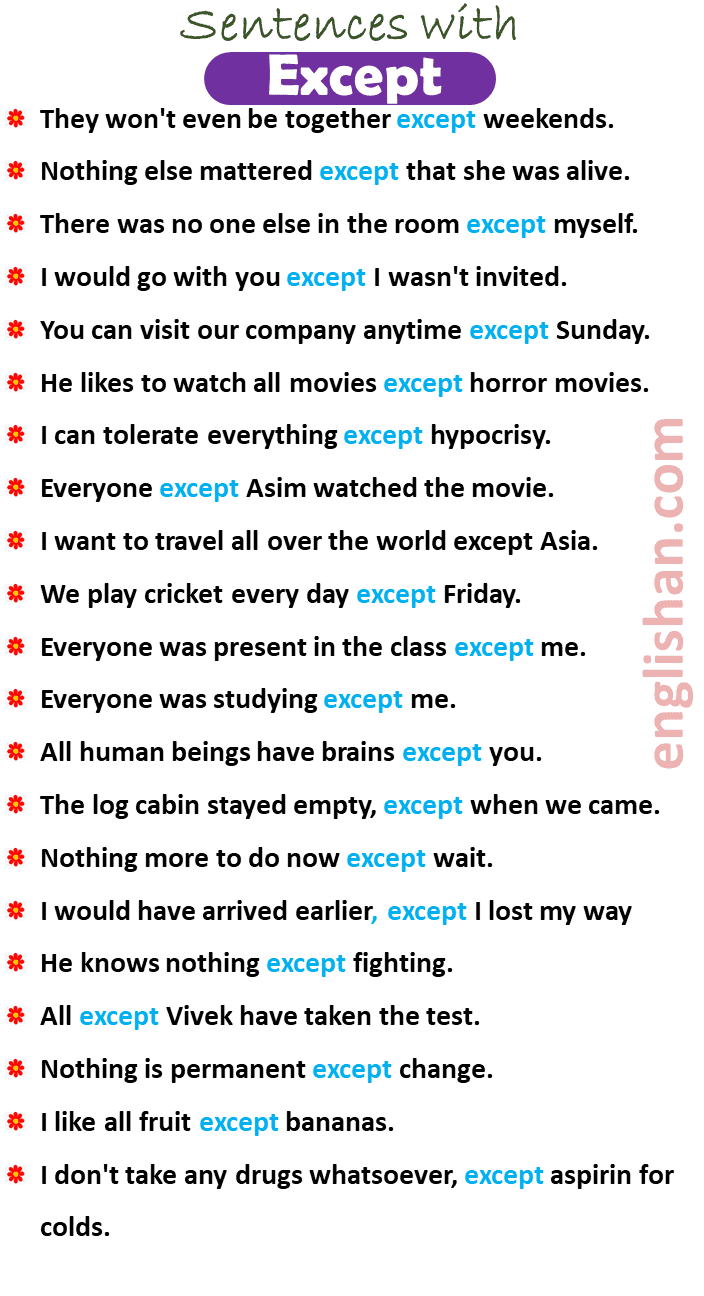
FAQs
1. Accept: To agree or take.
Example: I accept your offer.
2. Except: To exclude.
Example: Everyone came except Jane.
3. Expect: To anticipate.
Example: I expect it to rain.
Trick to remember:
Accept = Agree.
Except = Exclude.
Expect = Anticipate.
The difference between accept and except in a sentence is:
1. Accept means to agree to or receive something.
Example: I accept your apology.
2. Except means to exclude or leave out.
Example: Everyone was invited except Sarah.
Trick:
Accept = Agree/Take.
Except = Exclude.
Here’s the difference between expect and aspect:
1. Expect: Means to think something will happen or to anticipate.
Example: I expect it will rain today.
2. Aspect: Refers to a part, feature, or side of something.
Example: One aspect of the movie I liked was the music.
Trick to Remember:
Expect = Anticipate.
Aspect = A feature or part.
The words acceptable and exceptable are very different, and exceptable is rarely used. Here’s the difference:
1. Acceptable: Means something is good enough or allowed.
Example: This answer is acceptable for the test.
2. Exceptable: Means something can be excluded (rarely used).
Example: These items are exceptable from the rule.
Trick to Remember:
Acceptable = Good enough or okay.
Exceptable = Excludable (not common in modern English).
You May Also Like
